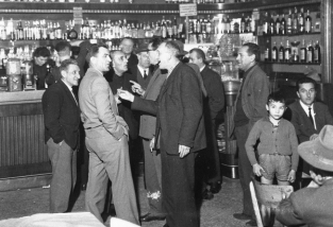
Have you ever sat in a bar listening to Italians chatting away and heard the same phrases used regularly by everyone and wondered what they mean? Here are eight common expressions used by Italians that you can learn and weave into your holiday Italian to make you sound just like a local.
Che ne so - When asked a question that they cannot answer, Italians often use this phrase accompanied by a shrug of the shoulders or their palms open as they shake their head. The phrase is a colloquial one meaning, ‘how should I know’ and shouldn’t be confused with Non lo so (I do not know) used in normal parlance.
Non mi va - It covers many situations and is used mainly to mean, ‘I don’t feel like it’. You’ll often hear children saying this when they are asked to something less interesting than having fun
.
Allora - Sometimes it’s as if every second word spoken is allora, usually it’s used as a pause or to slow down speech as the speaker thinks, meaning ‘then’, ‘therefore’, ‘in that case’ etc. It’s a simple word that is often used in the same way the English say, ‘like’ or ‘you know’ mid-sentence.
In bocca al lupo - Meaning ‘in the wolf’s mouth’, this phrase is often used to wish someone well; to wish a friend good luck in their endeavours. It is used to bless someone who is struggling to overcome difficulty and is often responded to with the phrase, crepi il lupo, meaning ‘hopefully the wolf will die’, symbolising the hope that the outlook will be favourable.
Neanche per sogno - It is a slightly impolite phrase meaning ‘in your dreams’ that many young people use in a friendly manner when asked something they don’t agree with, they use it to say, ‘no way’.
Sono stanco This is a useful phrase; after spending the day sightseeing and walking around the many art galleries and ancient monuments, what will feel better than sliding into a seat at the local bar and saying, sono stanco, meaning ‘I’m tired’, who knows the barman may take pity on you and serve you an aperitivo on the house.
Magari It's a great phrase to use if someone asks you if you’d like to stay in Italy indefinitely; meaning ‘if only’, it’s used to express hope. It wouldn’t be out of place if used to express your desire to win something.
Salve, come va? - Literally meaning, ‘hello, how’s it going?’ This is a more colloquial way of saying, 'Buongiorno, come stai?’ meaning good morning, how are you, it’s used as a friendlier, less formal way of greeting someone, but remember don’t use this in formal situations when you need to use the formal, come sta.
For more fun with the Italian Language check our Learn Italian dedicated section. - See more at: http://www.italymagazine.com/news/eight-phrases-make-you-sound-local#sthash.iEV4mVvi.dpuf
Che ne so - When asked a question that they cannot answer, Italians often use this phrase accompanied by a shrug of the shoulders or their palms open as they shake their head. The phrase is a colloquial one meaning, ‘how should I know’ and shouldn’t be confused with Non lo so (I do not know) used in normal parlance.
Non mi va - It covers many situations and is used mainly to mean, ‘I don’t feel like it’. You’ll often hear children saying this when they are asked to something less interesting than having fun
.
Allora - Sometimes it’s as if every second word spoken is allora, usually it’s used as a pause or to slow down speech as the speaker thinks, meaning ‘then’, ‘therefore’, ‘in that case’ etc. It’s a simple word that is often used in the same way the English say, ‘like’ or ‘you know’ mid-sentence.
In bocca al lupo - Meaning ‘in the wolf’s mouth’, this phrase is often used to wish someone well; to wish a friend good luck in their endeavours. It is used to bless someone who is struggling to overcome difficulty and is often responded to with the phrase, crepi il lupo, meaning ‘hopefully the wolf will die’, symbolising the hope that the outlook will be favourable.
Neanche per sogno - It is a slightly impolite phrase meaning ‘in your dreams’ that many young people use in a friendly manner when asked something they don’t agree with, they use it to say, ‘no way’.
Sono stanco This is a useful phrase; after spending the day sightseeing and walking around the many art galleries and ancient monuments, what will feel better than sliding into a seat at the local bar and saying, sono stanco, meaning ‘I’m tired’, who knows the barman may take pity on you and serve you an aperitivo on the house.
Magari It's a great phrase to use if someone asks you if you’d like to stay in Italy indefinitely; meaning ‘if only’, it’s used to express hope. It wouldn’t be out of place if used to express your desire to win something.
Salve, come va? - Literally meaning, ‘hello, how’s it going?’ This is a more colloquial way of saying, 'Buongiorno, come stai?’ meaning good morning, how are you, it’s used as a friendlier, less formal way of greeting someone, but remember don’t use this in formal situations when you need to use the formal, come sta.
For more fun with the Italian Language check our Learn Italian dedicated section. - See more at: http://www.italymagazine.com/news/eight-phrases-make-you-sound-local#sthash.iEV4mVvi.dpuf
 RSS Feed
RSS Feed

